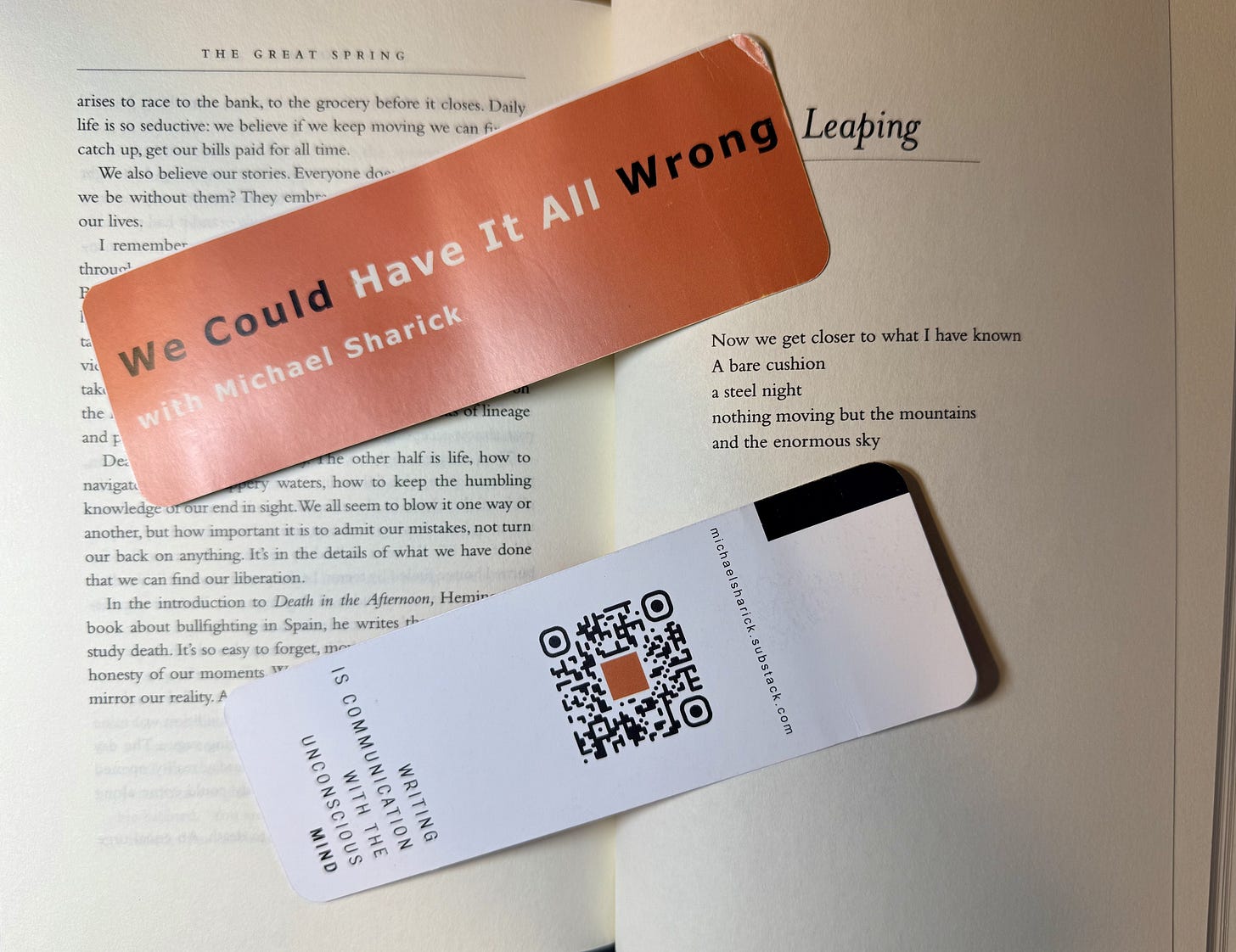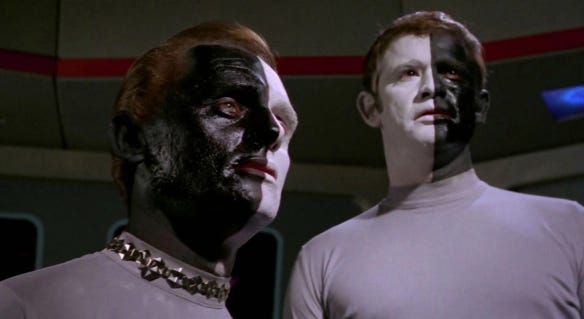Dear Subscribers,
One-year anniversary post
Dear Subscribers,
This week marks the one-year anniversary of this newsletter, still titled We Could Have It All Wrong with Michael Sharick. To celebrate, I’d love to send you some branded swag. Nothing fancy—just a pair of bookmarks:
Please complete this survey, and I’ll be glad to send you some in the mail.
If you don’t want to share your address, that’s totally okay—nothing changes. You’ll still receive regular posts as usual.
I’m grateful for every subscriber, whether you’ve been here a year, or just signed up last week. Whether you read every post the instant it drops, or if you sit on them for a few months. Here are some of the best essays from the first year:
- The Wicked Sense of Accomplishment
- The Second First Day of Winter
And here are some quick links to on-going series: Reflection on One Word, Severance (TV discussion), and Superman Is America.
If you know anyone who might enjoy the kind of storytelling I’ve settled into, please do share widely.
We’ve been doing a lot of family TV and reading in our home this summer. Here are some stories we’ve enjoyed all together:
A Small Light (Prime video, 2023). This 8-episode series is about Miep Gies, one of the people who helped hide Anne Frank and her family from the Nazis in Amsterdam, 1942.1 Themes include fear and persecution of the other, and mother/daughter tension. Not for the faint of heart.
Wednesday (Netflix, 2022- ). Popcorn. Part of The Addams Family franchise. Some scene-chewing performances, along with some brilliant and some cringe-worthy VFX.2 Themes include fear and persecution of the other, and mother/daughter tension. Not for the faint of heart.
Number the Stars (Lois Lowry, 1989). Newbury-winning novel about a Danish family who helps to hide Jews from the Nazis in Copenhagen, 1943. Find me another novel that can be read by an 8-year-old, a 10-year-old, a 42-year-old, a 45er, and a senior citizen. Themes include fear and persecution of the other, and mother/daughter tension (…). Designed for the faint of heart, or so it would seem.
Alien: Earth (Hulu). A brand-new series from writer/director/showrunner and national treasure Noah Hawley (Legion, Fargo, and he almost had a Star Trek movie…). Franchise prerequisites are Alien (1979) and Aliens (1986), but you can skip the rest. We’ve only seen a few episodes, but it looks like themes include fear and persecution of the other3, and Mother/bot-her tension. Definitely not for the faint of heart.
The kids have been enjoying The Wonderfully Weird World of Gumball (Disney+, 2025) from French artist Ben Bocquelet. I can’t say I love it myself, but the mix of different animation styles is interesting, and the kids can’t tear themselves away.
My wife has been inhaling Fates and Furies (2015) by Lauren Groff. Some familiarity with Greek mythology makes it more fun, but not a requirement.
I’ve been deep into The Great Spring: Writing, Zen, and this Zigzag Life (2016), by Natalie Goldberg. If we know Natalie, it’s probably from her first book, Writing Down the Bones (1986), but I’ve taken to her more recent work. There’s something about the ease of her style that captures me. I lose myself. She makes writing look and feel so simple, and but we know that she works at it more than most of us.
One of my favorite writers, Peter Orner, released a new novel last week, The Gossip Columnist’s Daughter (2025). As of this letter I’m only halfway through it. Every page is surprising. Catch him on book tour this fall.
Also on tour this fall: The Wood Brothers, with their brand new album Puff of Smoke. The title track is the insightful optimism we never don’t need.
Has anyone seen a new movie called Weapons?
We Could Have It All Wrong with Michael Sharick is free, and it will remain free if you want it to be, if you need it to be. If you can afford a paid subscription, and you want to help support the work, you can upgrade. A one-year paid subscription is only $30, or $2.50 a month.
However you choose to be here, I am grateful, and I look forward to our next meeting, whenever that may be.
Thanks, and see you soon,
Michael
Every day as a puff of smoke
Before you know it, it comes and goes
Maybe it burns your throat
And if you're lucky, you get high…
Every day as a puff of smoke
A little cloud of heartbreak and hope
And maybe it's God's little practical joke
And if you're lucky, he stops by
--Chris Wood, Oliver Wood, Jano Rix
This show premiered on Disney+, but is now only available on Prime. Disney, is there something about this show that makes you not want to host it in 2025? Is it the persecution of Jews? Is it the military occupation of a capital city? Is it the depiction of friends and neighbors snatched off the street and sent to “work” camps? Seems like something for everyone!
The definition of “cringe” seems to have expanded. In the past, if we used it w/r/t art, it referred to a finished work that was embarrassingly bad. Now we use it regarding our drafts, which are often necessarily bad. If we cringe at our drafts, then we refuse to revise or make a new draft, because we can’t stand to look at our own cringe, and so we might never finish anything.
Or, who knows; maybe the whole idea of wanting to send out branded bookmarks is cringe.
I might have written about this before: we can be increasingly skeptical of sci-fi’s attempts at allegory, and allegory in general. We might be tempted to see the Outcasts from Wednesday as representative of real-world marginalized communities, and their persecution by “normies” as allegory. That interpretation falls apart when we see that the Outcasts supernatural abilities (the Sirens can control people with their minds, the Werewolves are physically dominating, the Avians control birds, some people can wield fire, and there’s a zombie who feasts on human brain matter) are meaningful differences, whereas real-world human racial and social differences aren’t nearly as significant. The allegory works a little bit better within Nevermore Academy (the school is a stand-in for Hogwarts or Xavier’s School for Gifted Youngsters) when we see the different groups pitted against each other instead of the normies.
Likewise in Alien: Earth, we might want to see the various artificial life forms (there are three variants: Synthetics—fully artificial beings, like Ian Holm’s Ash from Alien or Lance Henriksen’s Bishop from Aliens; Cyborgs—humans with electronic implants; and Hybrids: human minds encased in synthetic bodies. Hybrids are the stars of Alien: Earth, and they have the minds of children, which the show renders masterfully.) as similarly allegorical, but again the metaphor falls apart. The AI are significantly stronger and faster than humans. In episode 2, a cyborg reminds a group of hybrids that “fear is for animals, and you are not animals.”
As is often the case, Star Trek wins the game. The fifteenth episode of season three, from 1969, “Let That Be Your Last Battlefield,” written by Gene Coon and Oliver Crawford, contains the allegory in a pair of characters, Bele (Frank Gorshin) and Lokai (Lou Antonio), while our main characters watch, pass judgement, and fail to assist in any meaningful way. Bele and Lokai are made up to look like half-moon cookies, literally black and literally white, split down the middle. It is quite clear to the viewer and to Captain Kirk and crew that they are cut from the same cloth. And yet the two are bitter enemies:
BELE: It is obvious to the most simple-minded that Lokai is of an inferior breed.
SPOCK: The obvious visual evidence, Commissioner, is that he is of the same breed as yourself.
BELE: Are you blind, Commander Spock? Well, look at me! Look at me!
KIRK: You're black on one side and white on the other.
BELE: I am black on the right side.
KIRK: I fail to see the significant difference.
BELE: Lokai is white on the right side. All of his people are white on the right side.
There’s nothing like this kind of TV moment, when character and viewer realize a simple truth that’s been available from the start, but we didn’t see it, and now we can’t unsee it.
My guess is that if these seemingly allegorical texts stand the time test, it’s because they’re also hitting us with universal themes. Pure allegory is weak and ultimately unsatisfying.
I don’t know. I could have it all wrong. What do you think?





Congrats on the year anniversary!
A recent episode of podcast Smartless features James Gunn which was interesting regarding his recent Superman fare and more! (Pod Good while driving, cooking, etc.)